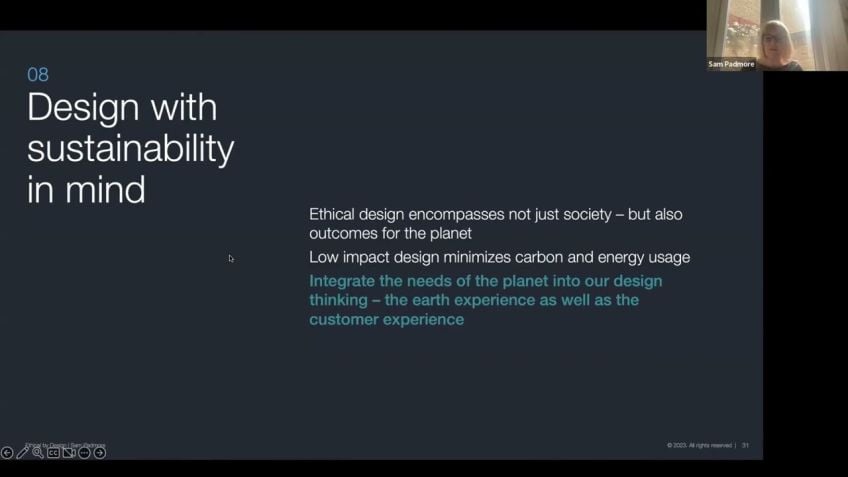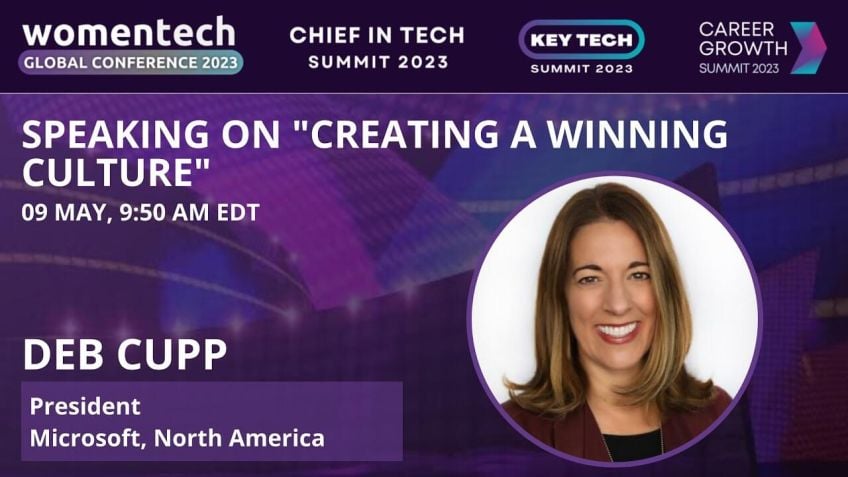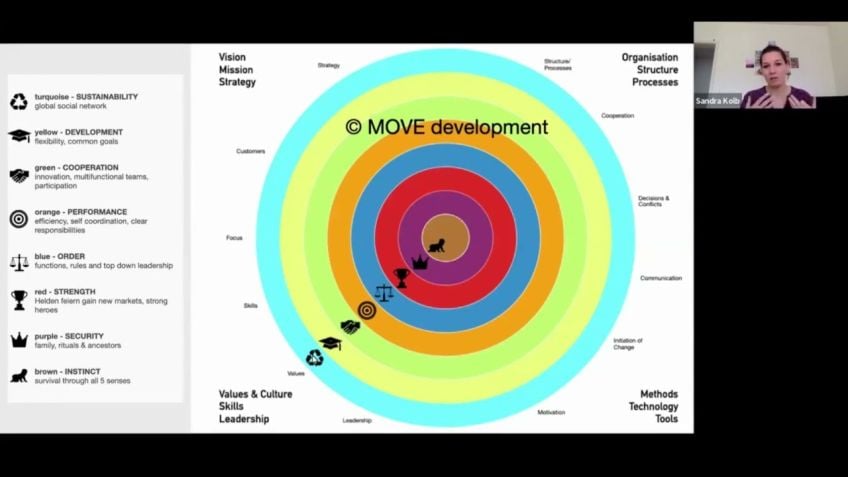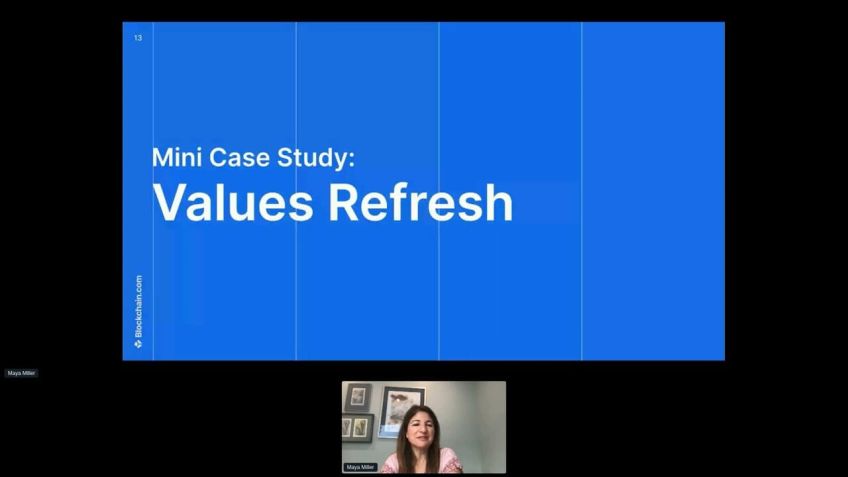From 100 to 1000: How do you scale culture? by Maya Miller
Scaling Culture Through Rapid Growth: Why It's Important and How to Do It
Good day! I'm Maya Miller and it’s a thrill to be here. Today, we’ll be discussing a critical yet often undervalued topic: scaling culture during rapid growth. How important is it? And how do we best do it?
Why is Culture Important in Growing Organizations?
Culture, by definition, is the behaviors, customs, beliefs, and values shared by a group of people. Thus, in defining your organization's culture, values become a critical component. They provide deeply ingrained principles that guide decisions, behaviors, attitudes, and actions. They can be seen as your organization’s unique ‘DNA’or blueprint, and act as a litmus test for doing the right thing.
Investing in creating well-defined values is critical for several reasons. For starters, strong culture attracts, engages and retains talent, especially in an environment where there's a high demand for talents. Furthermore, it naturally weeds out individuals that aren’t champions of your culture. Lastly, integrating strong values into all aspects of your operation can help build brand reputation, guide product decisions, and deeply influence customer experience.
Companies known for their strong emphasis on values include Amazon, Airbnb, Uber, Zappos, and Netflix. These organizations not only established robust values but also effectively incorporated them into their decision-making processes.
Bringing Values to Life in Your Organization
Instilling values in an organization is much more than putting them on a poster or sharing them during an orientation. It requires purposeful communication planning and making the values real for every employee. Leaders must incorporate these values into the everyday vocabulary – during all-hands meetings, in internal emails, team gatherings, and even in the decision-making framework of the organization.
Take the example of Blockchain.com, where one of our values is long-term. This influences our decisions where we often ask – "Are we making this decision for the long-term or is this an easy short-term resolution?"
Key Points on Creating Effective Values and Culture
- Remember that your values are created for your employees. They will certainly impact customers, brands, and products, but primarily, they should guide and benefit your employees.
- While creating values, it’s important to not seek consensus. Not every employee can embody the culture you want to foster. Selectively but inclusively identify people who have a good understanding and alignment with your company’s values and communicate your values through them.
- Think about cultural differences. Ensure the elements of your values don't conflict or cause dissonance in different cultural contexts.
Choosing the Right Time to Refresh Values
Lastly, realizing when it's time to refresh your values can be crucial. This could be different for every organization. It may not necessarily be about hitting a certain headcount or after a particular period has passed. It’s more about major milestones in your organization's lifespan. These could include significant headcount growth, change in leadership, or a need for a cultural shift, as seen in companies like Uber.
Strong, clear, and applicable values are key to thriving in a rapid-growth environment. They not only bring benefits to the employees but to the organization as a whole, influencing decisions that ultimately result in long-term success.
So think about it - if being part of a strong culture is important to you, consider how you can implement these insights and shape the narrative around your company’s culture. Remember, the best time to build and strengthen your culture is now.
Have any questions or thoughts on the importance of culture and values in growing organizations? Feel free to reach out directly via email at Maya@blockchain.com.
Thanks for tuning in, and here’s to fostering a vibrant culture in your organization!
Video Transcription
Good morning or good afternoon or evening. Um I'm Maya Miller and honored and thrilled to be here with you.My topic today is on scaling culture through rapid growth, why it's important and how to do it feel free to add questions in the comment box or the chat box. And I'll also leave some time at the end for Q and A. So double clicking on the agenda. I'll give a brief bio on my background as well as blockchain.com talk about defining what is culture and how do values relate to culture a bit on the why? Why is this all important and a real life current case study and ending with some um some tips and the Q and A. My main objective here is for you to walk away with a summarized playbook for scaling culture within your org. So first a brief bio on me, I am based in San Francisco where I've been most of my career, leading people, teams primarily for tech start ups, but also large financial institutions. I've been the first hire at multiple orgs and then doubled or tripled the companies and including taking one company public.
Um So I've seen scale, but I also think it's important to have had an experience at a large public company to understand what a well oiled machine looks like in the long term. Uh start ups are where my heart is. I love building and being able to see the immediate impact of my team's work on the organization employees and culture. When I joined blockchain.com 15 months ago, we had less than 100 and 50 employees. Um We've also acquired six companies in that time yet, most of our 2.6 X growth has been organic from our own recruiting team. So in case you aren't familiar with blockchain.com, um We believe in creating a financial system for the internet that allows anyone anywhere to control their money. Um We were founded in 2011. So making us one of the earliest crypto platforms, we provide an easy way to invest in crypto for tens of millions of customers over in over 200 countries. So now let's dive into our topic for today. Culture. So I'm sure if I asked for a definition of culture, there'd be a variety of responses and that's because there are many definitions of it.
But for the purpose of today, it shows um kind of a common definition which is culture is the behaviors, customers, sorry, customs, beliefs and values shared by a group of people. So with shared values, as part of the definition of culture, it starts to paint the picture of why defining your values is a critical piece to what makes up your culture values are an organization's DNA or blueprint. What we stand for deeply ingrained principles that guide decisions, behaviors, attitudes and actions. And they also provide a litmus test for doing the right thing, leveraging your core values or actually leverage your core values to foster culture through go through growth.
Core values are the foundation of a culture, articulating and acting on your core values. As a company is the most effective way to foster culture through growth. Think of your values as the plumbing of a house, the culture being the house, the values being the plumbing interweaving throughout the house or laying the bricks of a foundation. That's the values. So why is this important? Yeah, why invest the time in creating our values? What makes it important values are like I said, the most critical components of culture? And um so then you know what, why do we care about culture? Why spend the time with culture while having a strong culture attracts, engages and retains the talent on your team particularly in this environment where um there's a high demand for talent, this becomes even more important. Um It will also naturally weed out people that aren't champions of your culture. It helps build brands, make product decisions and customers will also experience your values through your interactions with them values. Become your decision making criteria throughout the organization.
So here's a sample of some companies that are known for their values for having strong values, Amazon. They actually um have leadership principles as their values and they've fully incorporated that into their interview um process and questions as well. Airbnb will share, I'll share those in a minute.
Um Uber has gone through some values, some transformations of their values which has helped transform their culture. Um Zappos, I'll, I'll show those actually as well. And then Netflix, um you've probably heard of the Netflix Flix Culture deck. Um They're very known for having quite bold um kind of provocative values because values should really differentiate yourself. Values, differentiate a company. They're not just table steaks, these are Airbnb's values. And what I think is interesting about Airbnb is they defined their values from the very beginning of building the company. It's champion the mission, be a host, embrace the adventure and be a serial entrepreneur and those have stayed relatively the same since their founding.
Um I'll actually share a quote from their CEO on the values their co-founder. I think bringing in your first engineer is like bringing in a DNA chip to the company. So like what we were saying, values being the DNA of the organization, not many companies think about their values that early on. Um It's definitely more of the exception than the norm, but it's like, you know, kind of best practice to be decisive and purposeful in creating and nurturing your values from the beginning. Um Whereas most, most of us uh they kind of are developed by accident over time and then we can refine and refresh them as we go along. Um But research shows that at about your 1st 100 hires a culture starts to be defined. So now I'll walk you through actually, I think we have Zappos here. Yeah. Um So Zappos is also known for their core values. They also set theirs from the beginning and have a whole book on the process of that they went through and creating their core values. Um They've also really weaved theirs into their business practices and employee practices. So this is a as current as you can get case study, I'm in the process right now of leading the values refresh at Blockchain.
So I thought it would be great to uh relevant to share that today. Um And so these are our current values that were established a couple years ago. There's eight of them, they are short one word. Some of them are more of a noun than a action oriented um value, which is why we decided it was about time to do a refresh and kind of revisit our values are these, do these still resonate for us? Um Not really a full 180 in, in terms of our intention, but um kind of a revisit and refresh. We want to make it more memorable and concise. Eight is a lot to remember for an employ for all of the employees um in management. Um They also weren't actionable. We really want them to be action oriented values. And with our significant head count growth that I've mentioned, um you know, it's, it's a good opportunity to kind of re revisit. So what process do we follow first? It's defining your values.
So this could be the same process if you're defining that your very first values versus a refresh of your current values. Um I think it's important to note that values aren't consensus driven. Um You know, some, some companies maybe do like a company wide survey to, to gather their values. Um The reason I don't suggest that is, it's unlikely that every single employee is uh is a cultural carrier and really bodies, the values that you want to maintain and build and foster. Therefore, I suggest identifying a subset of your exemplary bar raiser employees that really do embody that culture that you want to continue to maintain and foster. Um combined with your exec team, your CEO your founders and from that group, interview them, interview them about their, their values, their personal values. You know, what, what values do they bring with them to work every day, regardless of whether they were, were rewarded, that could be one question another one. If you were to start your own business, what core values would you build in your organization?
And you could ask, you know, describe a stand out or, or meaningful moment at the company and that can kind of help pull out what their values are from. There. Take, take the themes or the values concepts, um you know, narrow it down to the, the core themes. Go back to that group that you originally um interviewed um to, to iterate and get additional feedback and then work with your marketing and communications team to wordsmith the values and create them into memorable phrases or words. So that's the first phase of defining your values.
Then we've got to bring them to life. Uh I'm sure many of us have worked for companies where the values were just a poster on the wall or in remote work. They're just on your new hire orientation first day Google Slide and then that's it. You have to put way more effort into making values stick. So a purposeful communication plan really bringing them to life, making them real. Um use the, the leverage the employees in management that were part of creating the values and have them share stories um from the company of each value, real life examples um make it a whole memorable experience. Um I also led this effort at ripple and we did a whole day on um on the values launch. So it started with uh all hands from our CEO broke out into small groups to be able to talk through them and um kind of share um stories. There was swag related to the values. We did a lunch and happy hour all themed around the values. So you know, be creative. And then there's probably the number one most important aspect of leveraging your values to scale culture is weaving them into every candidate and employee touch point. Again, think about the plumbing through your house.
So leadership needs to incorporate the values into the everyday vocabulary during all hands internal email team meetings um integrating, integrating them into the decision making framework of the company. Does this align with our values? For example, one of Blockchain dot com's values is long term in the in the current list of values. So in making a decision, are we making this decision for the long term or is this an easy short term decision and then weaving them into the entire employee experience and candidate? We're creating an interview playbook for the values. So behavioral interview questions that correspond with each value using it as promote promotion criteria. Um Does this employee embody the values of the organization in order to be promoted? It's about the the how along with the what in terms of promotions and performance um incorporating them into your employee recognition and rewards program. Um having it values awards for role modeling, the behaviors again on the performance, the values of the how if you think about the nine box, it's the what and the how the what being like the results and the outcomes, the how being the behaviors and values um managing out giving feedback, you know, performance management.
Um One of the hard parts with performance management is when it's the more behavioral software skills, uh aspects that are, you know, meeting expectations and being able to refer back to your values is a really helpful uh framework for that. Lastly, some additional tips, um employees are the ones that values are created for. Um they will absolutely impact customers and brands and products. But the intention when you're creating your values is with your employees in mind, um values and issues aren't created by consensus.
I already um explained that and be sure to think about the cultural differences um in terms of vocabulary. So for example, um being a part of a global company, um you know, check in with, with employees from across the world to make sure none of the words have um like a negative connotation or um reaction in other um cultures and that's it. So if being part of a strong culture is important to you consider coming to Blockchain despite our market conditions and um the impact it's had on some companies, we are still strategically hiring. We have over 100 and 50 open roles and we find that in bear markets, it's the best time to build. So thank you. Hopefully that um gave you a quick summary of how to define communicate and integrate your values. Throughout the organization in order to scale culture through rapid growth.
Amazing. Thanks Maya. Um We have a question in the chat and it looks like we have about three minutes for Q and A. If anybody wants to add one, please do. Um But for now coming from Los um oh, good Q and A is now open. Ok. Open Q and A. Um What are your thoughts on start ups that are in hypergrowth mode? But don't have any values? What are the pitfalls they face?
Well, pitfalls of not having values. Um Well, I think that's where it becomes kind of a, the culture becomes kind of like accidental haphazard creation of culture versus like an intentional purposeful culture. So you may find, depending on how the or just organic uh culture building and hiring has occurred, you may find that um you know, the culture is not what you intended it to be. And I, and I, I don't think it's ever too late. You can always create values. Um But I think it's also important, I meant to share this in the, in the tips. I think it's also important to differentiate between aspirational values and actual core values. If an organization chooses like aspirational values that aren't actually um practiced in the organization, it actually can have a negative impact on the employees. It feels like leadership is disconnected from the employees. So we're not walking our talk, we're saying we're this, but we're not.
Um So I think it's never too late to create your core values and most importantly, leaving them throughout all of the employee touch points to continue to maintain and foster and build upon them.
Awesome. Um Another follow up question, how can a company in hypergrowth mode be successful when hiring so quickly? Um Like, like blockchain.com has in the last year? Yeah.
Um It's hard, it's hard to get it right. 100% of the time. Um Most organizations don't, which is um also why values can be a helpful way to determine who um who embodies and is a culture carrier within your org. But I'd say the number one way to do it is to create the interview, playbooks around culture and values. So in each, what we do at blockchain.com is every interview, every interview loop has a culture carrier interview and that interviewer is just focused on the values and behaviors um through behavioral interview questions uh linked to our values,
great good points. Um Final question from Karen Howley. Um When do you think is a good time to refresh those values? Is it a time thing like five years have gone by, for example, or is it a size thing we've hit a certain amount of head count?
Yeah. Um Well, first, I think in creating the, the first set of values, the best practices at um within about 100 employees. Um And then in terms of refresh I'd say it really just depends. I don't think there's a hard and fast rule. I think it depends on the organization if there's been major change, um maybe a change in CEO um if there's been um you know, Uber did a transformation of their values based on, um you know, wanting to transform their culture. So I think it's more like major milestones in an organization's um um kind of lifespan versus a certain number of employees.
Makes sense. Perfect. Ok, I think we're at time. Um Thanks everybody for the questions and uh Maya's information is on here, even direct email. So if anybody has a question and wants to reach out um her email is Maya at blockchain.com. Thank you so much, Maya.
Absolutely. Thank you all and have a great rest of your day.





